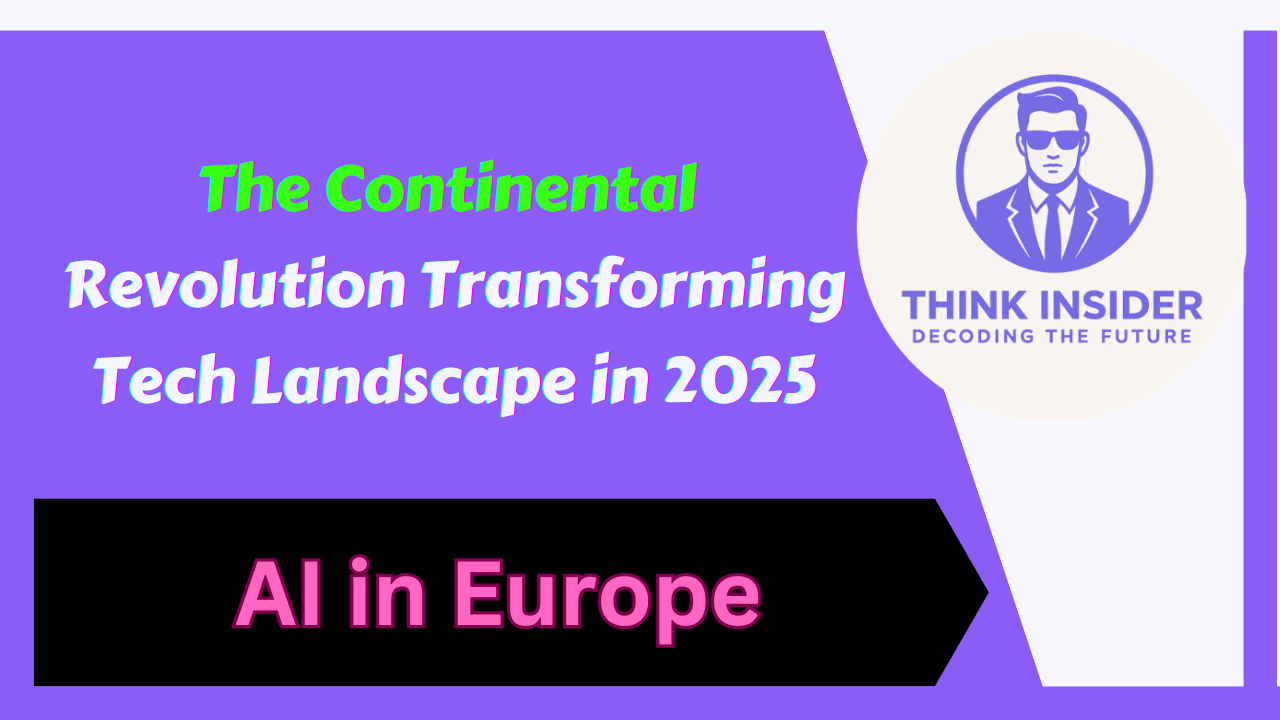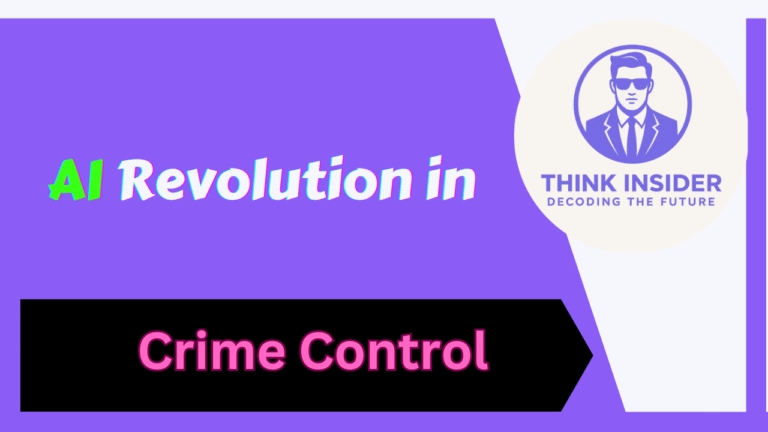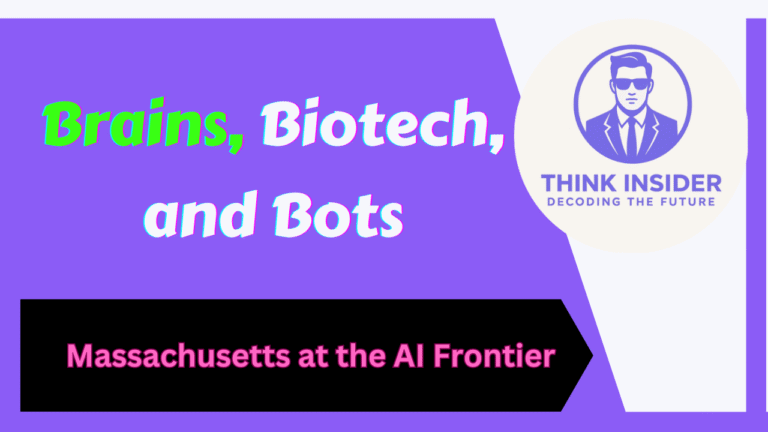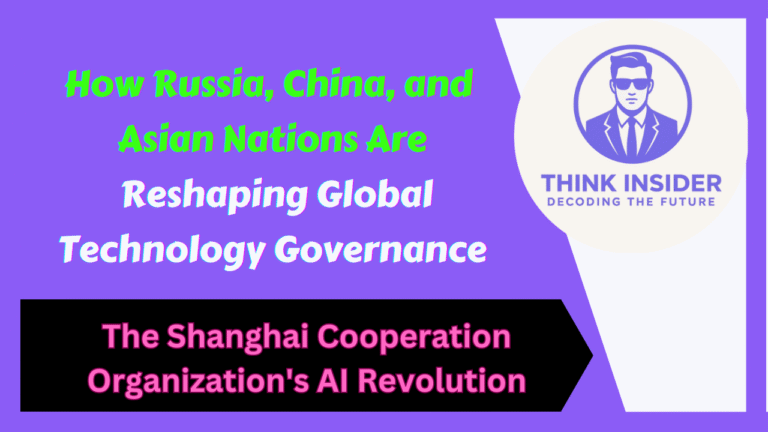AI in Europe: The Continental Revolution Transforming Tech Landscape in 2025
AI in Europe: The Continental Revolution Transforming Tech Landscape in 2025
How Europe's €200 Billion Investment is Reshaping Global AI Competition
€200 Billion
The European Union's massive investment to reshape its artificial intelligence landscape and compete with Silicon Valley
A €200 billion investment. That's what the European Union announced to reshape its artificial intelligence landscape. While Silicon Valley dominates headlines, Europe quietly builds something different—an AI ecosystem balancing innovation with ethics, competition with regulation.
Here's what surprised me most: In 2024, 41.17% of large European enterprises already use AI, while only 11.21% of small businesses have adopted it. The gap reveals both Europe's potential and its challenges.
But Europe's approach defies simple categorization. Unlike the U.S.-China rivalry that dominates AI discourse, the continent is carving out a future grounded in ethics, regulation, and targeted innovation. From London's DeepMind laboratories to Germany's precision engineering applications, from France's ambitious national champions to the EU's groundbreaking regulatory framework, Europe shapes AI on its own distinctive terms.
This analysis explores how the UK, Germany, France, and other European nations are positioning themselves in the global AI race. From massive government investments to groundbreaking startups, Europe's AI story is one of calculated ambition and strategic patience.
🚀 The €200 Billion European Gambit: Numbers That Matter
Europe's approach to AI investment differs markedly from the American model. While Silicon Valley celebrates unicorn valuations and rapid scaling, European nations focus on sustainable, long-term growth backed by substantial government support.
Commission President Ursula von der Leyen's InvestAI Initiative
The €200 billion mobilization includes a new European fund of €20 billion specifically for AI gigafactories. These facilities will house over 100,000 advanced AI processors to fast-track breakthroughs in healthcare, robotics, biotech, and more.
Enterprise Adoption Patterns Across Europe
| Company Size | AI Adoption Rate | Primary Focus Areas | Budget Constraints |
|---|---|---|---|
| Small Enterprises | 11.21% | Customer service automation | High - Limited funding |
| Medium Enterprises | 20.97% | Process optimization | Moderate - Growing investment |
| Large Enterprises | 41.17% | Comprehensive AI strategies | Low - Significant R&D budgets |
🇩🇪 Germany: Engineering Meets AI Precision
Germany's AI strategy reflects its manufacturing heritage—practical, methodical, and focused on industrial applications. The country approaches AI with the same precision it brings to automotive and industrial engineering.
€5 Billion
Germany's commitment to AI development by 2025, focusing on research, industrial implementation, and infrastructure
The Strategic €5 Billion Breakdown
🚗 Automotive Industry Success
BMW's Munich plant uses AI for quality inspection, reducing defects by 23% while increasing production speed by 15%. Mercedes-Benz employs machine learning for predictive maintenance, saving €12 million annually in unexpected repairs.
Advanced Computing Infrastructure Partnerships
Nvidia deployed computing infrastructure across Germany, including industrial AI clouds linked to BMW and Mercedes-Benz. This partnership demonstrates how Germany leverages international expertise while maintaining industrial leadership.
- Siemens integrates AI across 40+ factories worldwide
- AI-powered production systems achieve 99.7% uptime rates
- Berlin's Charité hospital reduces analysis time by 60% with AI diagnostics
- Diagnostic accuracy improves to 94.3% for complex cases
🇬🇧 United Kingdom: From Research Labs to Global AI Powerhouse
The UK positions itself as Europe's AI leader, leveraging financial sector expertise and research excellence. Post-Brexit Britain sees AI as essential for maintaining global relevance and economic growth.
$2.4 Billion
UK AI startups raised in the first half of 2025, representing one-third of the nation's total VC funding
Record-Breaking Investment Performance
The United Kingdom leads European AI investment by substantial margins. In the first half of 2025, UK AI startups raised $2.4 billion, exceeding Germany and France combined in AI funding.
📊 UK AI Investment Distribution
€4.2 billion (35% of European total) - While the UK raised approximately €16.4 billion across all startups in 2024, AI represents the largest single sector investment focus
| Sector | Investment Amount | Key Applications |
|---|---|---|
| Fintech AI | €1.8 billion | Trading systems, risk assessment |
| Healthcare AI | €980 million | Diagnostics, personalized medicine |
| Enterprise Software | €760 million | Automation, optimization |
| Cybersecurity AI | €680 million | Threat detection, prevention |
UK AI Success Stories
🧬 DeepMind (Google subsidiary)
Continues breakthrough research in protein folding and game theory. Their AlphaFold system revolutionizes drug discovery, with pharmaceutical applications worth billions.
🛡️ Darktrace
Cybersecurity AI platform protects 7,000+ organizations globally. IPO valuation reached £1.7 billion, demonstrating UK AI commercial success.
🏥 Babylon Health
AI-powered healthcare services reach 24 million users worldwide. Diagnostic accuracy matches human doctors in 85% of cases.
🇫🇷 France: Ambition Meets State-Backed Innovation
France combines AI innovation with strong regulatory frameworks, positioning itself as Europe's responsible AI leader. President Macron's administration has made AI a national priority, actively funding both academic institutions and private firms.
€109 Billion
Macron's February 2025 announcement for AI infrastructure investment, spanning computing clusters and data centers
Record Investment Growth and Strategic Partnerships
France saw its AI funding nearly double—from €1 billion in 2023 to €1.9 billion in 2024. This growth trajectory accelerated dramatically with the massive February 2025 infrastructure announcement.
🤖 Mistral AI Partnership Success
Nvidia deployed 18,000 Blackwell chips in France in partnership with Mistral AI, demonstrating the country's ability to attract cutting-edge hardware investments for AI development.
Cultivating Reverse Brain Drain
France successfully executes a "reverse brain drain" strategy, with returnees from DeepMind and Meta (including founders of Mistral AI) driving innovation in language models and applications. With strong expertise in mathematics and computer science, France emerges as a serious AI contender.
French AI Applications by Sector
| Sector | Key Improvements | Impact Metrics |
|---|---|---|
| Transportation (SNCF) | Predictive maintenance, Dynamic pricing | 18% delay reduction, 12% revenue increase |
| Healthcare | Radiological analysis, Drug discovery | 96% accuracy, 30% faster development |
| Energy (EDF) | Smart grid optimization, Safety monitoring | 15% waste reduction, 99.9% reliability |
🌍 Beyond the Big Three: Nordic Innovation & Eastern European Excellence
The Netherlands: AI Hub of Innovation
The Netherlands punches above its weight in AI development, leveraging strategic location and English proficiency to attract international talent and investment.
💰 Adyen: Payment Processing Excellence
Uses AI for fraud detection, protecting €516 billion in annual transactions. Machine learning algorithms identify suspicious patterns with 99.1% accuracy.
Scandinavia: The AI Welfare State
Nordic countries approach AI through social democratic lenses, emphasizing equitable access and societal benefits rather than purely commercial applications.
🎵 Spotify's AI Innovation
Music streaming leader pioneers recommendation algorithms serving 515 million users. AI drives 31% of music discovery, generating €12.9 billion annual revenue.
🚛 Volvo's Autonomous Future
Automotive safety leader tests self-driving trucks on Swedish highways. AI safety systems reduce accident rates by 47% in test scenarios.
Switzerland: Precision AI Excellence
Switzerland combines financial expertise with precision manufacturing to create specialized AI applications serving global markets.
- UBS: AI portfolio optimization for ultra-high-net-worth clients
- Roche: AI for cancer treatment personalization
- Novartis: Machine learning for clinical trial optimization
- CERN: AI processes 50 petabytes of particle collision data annually
⚖️ The European Union: Regulation as Global Soft Power
Beyond individual countries, the EU as a bloc wields enormous influence through regulation. The AI Act entered into force on 1 August 2024, establishing the world's first comprehensive AI regulation.
August 2, 2026
Full AI Act implementation date, with critical provisions already reshaping the global AI landscape
The Revolutionary AI Act Implementation Timeline
| Implementation Date | Requirements | Impact |
|---|---|---|
| February 2, 2025 | Prohibitions & AI literacy | Banned social credit scoring, emotion recognition |
| August 2, 2025 | General Purpose AI rules | Copyright safeguards, risk assessments |
| August 2, 2026 | Full Act implementation | Complete regulatory framework active |
| August 2, 2027 | High-risk AI compliance | Healthcare, employment AI systems regulated |
Risk-Based Regulatory Framework
🚫 Prohibited AI Systems (Effective February 2025)
- Social credit scoring by governments
- Real-time biometric identification in public spaces
- Subliminal techniques harming human decision-making
- Exploitation of vulnerabilities based on age or disability
- Emotion recognition in workplaces
🚧 Challenges Facing European AI Development
Despite impressive progress, European AI faces significant obstacles requiring strategic solutions.
The Critical Computing Power Gap
73% vs 15%
Large language models developed in the US versus China, while EU companies struggle to release similar technology
💻 Infrastructure Development Needs
European AI infrastructure gaps require urgent attention with €50 billion needed in data center investments, 10x increase in GPU availability, and fiber optic network expansion.
Talent Development and Retention Crisis
| Location | Average AI Engineer Salary | Additional Benefits |
|---|---|---|
| Silicon Valley | $180,000 | Stock options, career advancement |
| London | $75,000 | Research opportunities, stability |
| Berlin | $68,000 | Quality of life, social benefits |
- Germany offers €80,000 research grants for AI PhDs
- France provides visa fast-tracking for AI professionals
- Netherlands creates startup visa programs
- UK launches Global Talent Visa scheme
Market Fragmentation Challenge
Europe's 24 official languages create unique AI development challenges. Natural language processing requires 24 different models, training data collection becomes exponentially complex, and market penetration strategies must account for cultural differences.
📊 Investment Patterns and Market Dynamics
European AI investment patterns reflect regional strengths and strategic priorities, creating unique market dynamics.
2024 Investment Highlights by Country
Sector-Specific Investment Trends
🏆 Top European AI Funding Rounds 2024
- Mistral AI (France): €468 million Series B
- DeepL (Germany): €300 million Series B
- Typeform (Spain): €135 million Series C
- Synthesia (UK): €90 million Series C
- Persado (Greece): €70 million Series B
📈 European AI Success Metrics and Economic Impact
Measuring European AI success requires comprehensive metrics beyond simple investment figures.
Research and Development Excellence
Economic Impact Analysis
| Country | AI GDP Contribution | Absolute Value | Productivity Gains |
|---|---|---|---|
| United Kingdom | 2.3% | €48 billion | 18% service sector improvement |
| Germany | 1.9% | €74 billion | 23% manufacturing increase |
| France | 1.6% | €39 billion | 15% healthcare enhancement |
| Netherlands | 2.1% | €18 billion | 12% transportation optimization |
Employment Transformation
💼 Job Market Evolution
AI creates 480,000 new positions while displacing approximately 290,000 traditional jobs, resulting in net job creation of 190,000 roles across Europe. Average AI job salaries reach €72,000, 35% above median European wages.
🎯 Future Projections and Strategic Outlook
European AI development trajectories suggest significant transformation over the next decade.
€156.8 Billion
Projected European AI market value by 2030, representing sustainable 21% compound annual growth
Market Growth Trajectory
Technology Evolution Expectations
- 5x increase in available computing power
- 50% reduction in cloud computing costs
- 80% of major cities with edge computing deployment
- 24 EU languages covered by multilingual AI models
Competitive Positioning Through Regulation
Europe's regulatory leadership creates competitive advantages. "Privacy-by-design" AI systems attract privacy-conscious customers, ethical AI development builds consumer trust, and regulatory compliance expertise becomes an exportable service.
🎯 Actionable Takeaways for Different Stakeholders
Different stakeholders require specific strategies to capitalize on European AI opportunities.
🏛️ For Government Leaders
- Allocate minimum 2% of government IT budgets to AI initiatives
- Reduce AI project approval times from 18 months to 6 months
- Offer 200% tax deductions for AI R&D investments
- Open AI-focused trade missions in Silicon Valley and Shenzhen
- Support cross-border AI projects spanning multiple EU states
👔 For Business Executives
- Conduct comprehensive AI readiness assessments
- Establish ethics committees and compliance procedures
- Budget minimum 5% of payroll for AI skills development
- Create innovation partnerships with universities and startups
- Implement AI solutions incrementally to minimize disruption
💰 For Investors and VCs
- Prioritize startups building AI Act-compliant systems
- Target industry-specific applications over general platforms
- Support cross-border expansion across European markets
- Balance investments across multiple European AI hubs
- Evaluate environmental impact of AI investments
🔬 For Researchers and Academics
- Focus research on multilingual AI and cultural adaptation
- Create GDPR-compliant AI methodologies
- Partner with companies for practical AI applications
- Lead pan-European research initiatives
- Contribute to European AI commons and knowledge sharing
🚀 Europe's AI Future: Beyond Silicon Valley Models
Europe's AI trajectory defies simple categorization. The €200 billion investment represents more than funding—it signals European determination to compete while maintaining social values.
Key Success Metrics:
- 41.17% of large European enterprises use AI
- 23% of global top-tier AI research from Europe
- €51.8 billion in annual AI-related exports
- 480,000 new AI jobs created across the continent
- €156.8 billion projected market value by 2030
By 2030, European AI will represent not just economic growth but successful integration of technology with societal values. The continent's approach proves artificial intelligence can advance human welfare while respecting democratic principles and environmental sustainability.
Frequently Asked Questions
European AI emphasizes ethics, regulation, and sustainability over pure market dominance. The EU AI Act creates the world's first comprehensive AI regulation, focusing on risk-based governance rather than unrestricted development. European companies prioritize GDPR compliance, democratic values, and environmental responsibility, creating AI systems designed for long-term societal benefit rather than short-term profits.
The UK currently leads European AI investment with $2.4 billion raised by startups in the first half of 2025, representing one-third of the nation's total VC funding. Germany follows with €3.1 billion (26% of European total) and France with €2.4 billion (20%). Each country develops distinct specializations: Germany excels in industrial AI applications, the UK dominates financial services AI, and France pioneers AI regulation and ethics.
The AI Act creates risk-based regulation without stifling innovation. It prohibits harmful AI applications like social credit scoring while requiring transparency for high-risk systems. European companies gain competitive advantages through early compliance expertise, and "privacy-by-design" AI systems attract global customers prioritizing ethical technology. Critics argue regulations could stifle innovation, but supporters see it as Europe's competitive edge in trustworthy AI.
European AI faces infrastructure constraints (73% of large language models originate from the US), talent competition (Silicon Valley offers $180,000 average salaries vs London's $75,000), and market fragmentation across 24 EU languages. However, European retention strategies include Germany's €80,000 research grants for AI PhDs and France's successful "reverse brain drain" bringing talent back from Meta and DeepMind.
European AI development creates 480,000 new positions while displacing approximately 290,000 traditional jobs, resulting in net job creation of 190,000 roles. New positions include AI trainers, data scientists, and ethics officers. Average AI job salaries reach €72,000, 35% above median European wages, while reskilling programs require €12.4 billion investment.
European AI startups benefit from government support programs, regulatory sandboxes, strong university partnerships, and access to the €200 billion investment initiative. Startup survival rates reach 67% after three years (above global average), with 34% achieving international expansion within five years. Female founder representation at 23% exceeds Silicon Valley, indicating inclusive ecosystem development.
Sources and References
- European Commission InvestAI Initiative
- Eurostat Enterprise AI Usage Statistics 2024
- German Federal Ministry AI Investment Strategy
- UK AI Opportunities Action Plan 2024
- EU AI Act Official Implementation Guide
- France AI Investment Analysis PwC Report 2024
- European AI Research Output Analysis Nature Index
- McKinsey European AI Economic Impact Study 2024
- OECD AI Employment Impact Assessment Europe
- Tech.eu European AI Investment Analysis 2025






